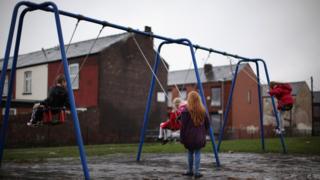Struggling towns to get £1.6bn post-Brexit boost
 Image copyright Getty Images
Image copyright Getty Images A £1.6bn fund is being launched by the government to boost less well-off towns after Brexit.
Prime Minister Theresa May said: “For too long in our country prosperity has been unfairly spread… but we want it to work for all communities.”
More than half the money will go to the north of England and the Midlands to bring jobs and boost economic activity.
Labour says it is a bribe to influence MPs in Leave-supporting areas to back Mrs May’s Brexit deal.
Last month MPs rejected the withdrawal deal Mrs May has reached with the EU by 230 votes – the biggest defeat for a sitting government in history.
To win another vote, which Mrs May has promised will be on or before 12 March, she could find herself relying on the votes of Labour MPs from Leave-voting parts of the country.
John Mann, MP for Bassetlaw, a former coal mining area in Nottinghamshire, told the PM last month to “show us the money” with “transformative investment” in areas that voted to Leave.
The Labour MP, who backed Mrs May’s Brexit deal, denied it amounted to “transactional politics”.
But John McDonnell, Labour’s shadow chancellor, said the fund “smacks of desperation from a government reduced to bribing MPs to vote for their damaging flagship Brexit legislation”.
And Labour MP Alex Sobel, of the cross-party People’s Vote campaign, which wants a new referendum on Brexit, said it was “a drop in the ocean” compared to the cost of Brexit.
He said the the annual loss to local economies would be more than enough to wipe out any potential return from this scheme.
But Mrs May said: “Communities across the country voted for Brexit as an expression of their desire to see change – that must be a change for the better, with more opportunity and greater control.
“These towns have a glorious heritage, huge potential and, with the right help, a bright future ahead of them.”
Analysis: Is May buying votes?
By BBC political correspondent Iain Watson
A month ago the Labour MP John Mann – who voted to leave the EU – told the BBC there was a “good dialogue” going on with the government.
And he was hopeful Mrs May would come back with “something significant” for his, and other, areas outside London.
He and a group of Labour MPs from Leave areas were demanding the protection of employment rights after Brexit – and assurances poorer areas wouldn’t lose out when EU regional funding ended.
The cash on offer from the government is equivalent to less than 2% of English local authority spending.
Theresa May says she is simply making good a promise she made in her first speech as prime minister to help “ordinary working class families”.
But the Labour leadership see this is a “bribe” to tempt some of their own MPs to break ranks and back Mrs May’s deal.
The former Conservative, now Independent, MP Anna Soubry claims it’s an attempt to buy votes.
But the government insists the true beneficiaries will be residents of coastal and industrial communities who feel left behind.
The £1.6bn fund includes £600m, which communities in any part of the UK can bid for, and £1bn allocated using a needs-based formula to the following areas:
- North-west England: £281m
- North-east England: £105m
- Yorkshire and the Humber: £197m
- West Midlands: £212m
- East Midlands: £110m
- South-west England: £33m
- South-east England: £37m
- East England: £25m
The government said communities would be able to draw up job-boosting plans for their town, with the support and advice of their Local Enterprise Partnerships.
It added that it would also seek to ensure towns in Wales, Scotland and Northern Ireland would benefit from the new funding.
Communities Secretary James Brokenshire said the government had listened to people concerned by “momentous changes to their communities” and he was determined to provide the support they needed to create a “more prosperous future beyond Brexit”.







